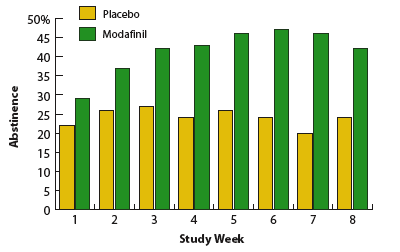NIDA-supported researchers evaluating modafinil's potential to enhance behavioral treatment for cocaine addiction have reported a second successful clinical efficacy trial. The new results affirm and extend the promising findings of the earlier, smaller, and less stringent "open label" trial, and they set the stage for large-scale multisite trials that could definitively establish the medication's usefulness.
Dr. Charles Dackis and colleagues at the University of Pennsylvania Treatment Research Center recruited 62 individuals (44 male, 18 female; mean age, 44.5 years) for their double-blind study. All had come to the Center seeking treatment for cocaine addiction, had ingested at least $200 worth of cocaine in the 30 days prior to presenting for treatment, and met the cocaine-dependence criteria of the Diagnostic and Statistical Manual of Mental Disorders, 4th Edition (DSM-IV). The patients agreed to visit the clinic twice a week for individual sessions of cognitive-behavioral therapy (CBT) and provide urine samples 3 times a week for the 8-week course of the study. Once each week, the clinic staff dispensed a week's supply of pills, either modafinil in daily doses of four 100 mg pills (30 patients) or an equal number of identical-looking placebo pills (32 patients).
 Combining Modafinil With Behavioral Therapy in Cocaine Addiction Treatment Increases Likelihood of Abstinence. Abstinence rates among patients who received modafinil plus behavioral therapy during 8-week cocaine addiction treatment were consistently higher than rates among patients who received placebo.
Combining Modafinil With Behavioral Therapy in Cocaine Addiction Treatment Increases Likelihood of Abstinence. Abstinence rates among patients who received modafinil plus behavioral therapy during 8-week cocaine addiction treatment were consistently higher than rates among patients who received placebo.Throughout the study, modafinil-treated patients gave fewer cocaine-positive urine samples than the placebo group. "More impressive, though, is the fact that more than twice as many modafinil patients as placebo patients (33 percent compared with 13 percent) were able to attain abstinence for 3 weeks or more," Dr. Dackis says. "Maintaining abstinence for a prolonged period during treatment is an important clinical threshold. Cocaine is a binge drug, and it is common in outpatient treatment for a patient to go 4 or 5 days without using, relapse, then have another clean week. The long continuous abstinence we saw with modafinil is a strong and encouraging signal that this medication can help patients avoid relapse during the critical first weeks of treatment." Both groups of patients attended the same average number of CBT sessions, he adds, further supporting the likelihood that modafinil was the factor accounting for reduced cocaine abuse in those who received it.
Modafinil, a medication currently used to treat narcolepsy, enhances levels of glutamate, a chemical that influences the activity of cells throughout the brain. Animal research has shown that repeated exposure to cocaine depletes glutamate levels in brain regions associated with development of dependence and addiction, and that increasing glutamate concentrations will block reinstatement of cocaine self-administration in rats—a model of relapse to drug abuse in humans (see "Brain Glutamate Concentrations Affect Cocaine Seeking," NIDA NOTES, Vol. 19, No. 3).
Modafinil's modulation of glutamate transmission may account for a striking effect reported by patients: "The mechanism for this isn't clear, but some patients receiving modafinil told us that if they did use cocaine it did not produce the irresistible urge to use more, which they had always felt before," Dr. Dackis says. "Some of the patients told me they had flushed cocaine away. In 25 years of treating addiction, no one ever told me they threw away cocaine."
"The of research suggesting that modafinil is effective in treating cocaine addiction is growing," says Dr. Ivan Montoya of NIDA's Division of Pharmacotherapies and Medical Consequences of Drug Abuse. "Animal research supports the assumption that modafinil reverses the cocaine-induced neurochemical disruptions of glutamate and of dopamine-containing neurons in the brain's reward centers. Clinically, modafinil has effects that are opposite to the symptoms of cocaine withdrawal, which usually include oversleeping, depression, poor concentration, and craving."
Dr. Dackis and his colleagues are now planning the next test for modafinil: a multisite clinical trial that will include more than 650 participants. The study will evaluate modafinil's efficacy in doses of 200 mg and 400 mg per day in combination with CBT, and results may be available by mid-2006, Dr. Montoya says.
Source
- Dackis, C.A., et al. A double-blind, placebo-controlled trial of modafinil for cocaine dependence. Neuropsychopharmacology 30(1):205-211, 2005. [Abstract]
